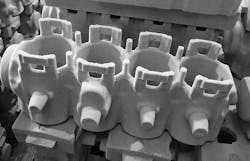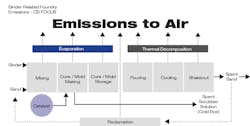Reducing VOCs, Solvent Condensation for Cold-Box Coremaking
Q: We operate a biodiesel, high-production cold-box coremaking system, but we aim to reduce VOC emissions, and reduce the threat of solvent condensation in air ducts, vents, and in baghouses — to reduce the threat of fires in ductwork. Do you have any suggestions?
A: The biodiesel systems have been very popular to reduce volatile organic compounds (VOCs), as well as unpleasant odors in the coremaking process emissions, but there are some drawbacks. A biodiesel system works well in coremaking, but in the casting process that follows for some foundries there is frequently the potential for these biodiesel materials to condense in green sand molds. In addition, there can be more build-up that increases the %LOI (loss on ignition) in cores and return cores to the green sand molding system.
Recently we have studied VOC exempt solvents and naphthalene-depleted aromatic solvents to reduce VOCs even further, and to reduce the threat of build-up in green sand systems and build-up of combustible solvents in pouring, cooling, and shakeout. It is important to look at the entire coremaking and casting process not only to control emissions as regulated but also to reduce the threat of fires in the pouring and cooling areas, which of course would interrupt production and destroy equipment (see Figure 1.)
Over the past 10-15 years Clean Air Act standards have driven iron and steel foundries to adopt these biodiesel solvents, to meet VOC requirements. The systems are efficient in process, and we had no other option currently for reducing VOCs to meet federal, state, and local regulations. Unfortunately, these solvents vaporize during the casting process and can condense in duct work or in cooling and shakeout areas. Using VOC-exempt solvents, this condensate can be reduced without the use of biodiesel solvents that can re-condense in green sand systems, and in pouring, cooling and shakeout areas. This is an important consideration for productivity in high-volume ferrous foundries that produce lots of cold box cores.
The new ECOCURE™ Biodiesel free systems offer a solution to reduce this threat and further reduce VOCs. In addition, the ECOCURE™ systems have very low levels of free phenol and undetectable free formaldehyde.
There are new solutions to these emissions challenges for many metalcasters seeking to improve their operations, reduce risk, and comply with regulations.
Join the Conversation. Email Your Questions for ASK Chemicals
Share your insights, opinions, and elaborate on the questions and the experts' answer(s). You must be logged in to the website in order to post your comments.

